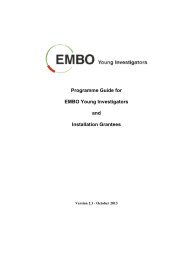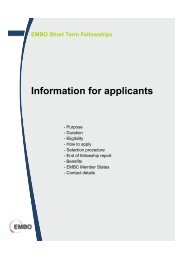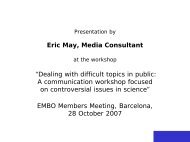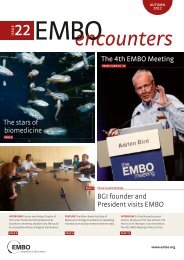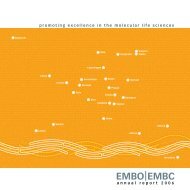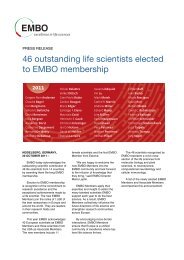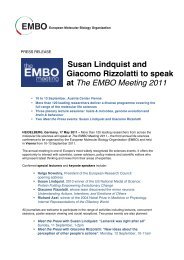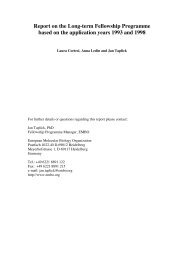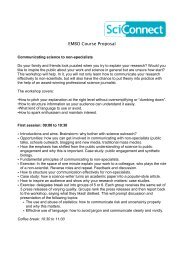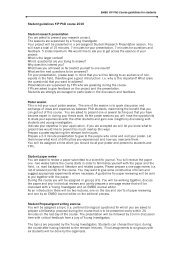EMBO Fellows Meeting 2012
EMBO Fellows Meeting 2012
EMBO Fellows Meeting 2012
Create successful ePaper yourself
Turn your PDF publications into a flip-book with our unique Google optimized e-Paper software.
Vanessa Luis<br />
<strong>EMBO</strong> <strong>Fellows</strong> <strong>Meeting</strong> <strong>2012</strong><br />
Lipid metabolism and malaria liver infection<br />
Abstract<br />
The liver stage constitutes the first obligatory step of Plasmodium infection in the vertebrate host, being<br />
hepatocytes the only cell type that can efficiently support complete growth and development of the<br />
Plasmodium exoerythrocytic form (EEF). This unique cellular environment allows the replication of single<br />
sporozoites into thousands of new merozoites over a period, for rodent infections, as short as two days.<br />
This extensive proliferation rate necessarily requires the availability of sufficient lipids for the synthesis of large<br />
amounts of additional membranes. Interestingly, while Plasmodium lacks some key enzymes for lipid<br />
synthesis, hepatocytes are specialized in the biosynthesis of lipids and the liver is known to play a central role<br />
in lipid homeostasis. It is therefore tempting to hypothesize that hepatocytes are favoured by Plasmodium<br />
sporozoites because of their inherent ability to mobilize lipids. In fact, ongoing work in the lab shows that by<br />
engaging the host cell’s resources to its own benefit (thereby fulfilling its molecular needs for multiplication),<br />
Plasmodium development inside the hepatocyte leads to alterations in host cell lipid metabolism. On the other<br />
hand, although only recently appreciated, there is an overwhelming amount of evidence that the metabolic<br />
systems, namely lipid metabolism, are integrated with pathogen-sensing and immune responses. Here, we<br />
observe that the modulation of host lipid metabolism through the administration of a rich-fat diet almost<br />
completely abrogates Plasmodium liver infection. We now propose to explain the mechanism behind the<br />
observed effect of the administration of exogenous lipids on infection by interrogating both the activation of<br />
the immune system and the metabolic alterations.<br />
Instituto de Medicina Molecular, Lisboa, Portugal<br />
14-17 June <strong>2012</strong>, Heidelberg, Germany



